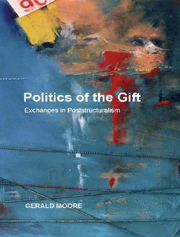Book contents
- Frontmatter
- Contents
- Acknowledgements
- Abbreviations
- Series Editor's Preface
- Introduction: Spectres of Mauss
- 1 Speech, Sacrifice and Shit: Three Orders of Giving in the Thought of Jacques Lacan
- 2 The Eternal Return of the Gift: Deleuze (and Derrida) contra Lacan
- 3 Repeating the Political: Heidegger and Nancy on Technics and the Event
- 4 ‘Pour en finir avec …’: Democracy and Sacrifice
- Conclusion: Variations on a Theme from Nietzsche
- Bibliography
- Index
3 - Repeating the Political: Heidegger and Nancy on Technics and the Event
Published online by Cambridge University Press: 12 September 2012
- Frontmatter
- Contents
- Acknowledgements
- Abbreviations
- Series Editor's Preface
- Introduction: Spectres of Mauss
- 1 Speech, Sacrifice and Shit: Three Orders of Giving in the Thought of Jacques Lacan
- 2 The Eternal Return of the Gift: Deleuze (and Derrida) contra Lacan
- 3 Repeating the Political: Heidegger and Nancy on Technics and the Event
- 4 ‘Pour en finir avec …’: Democracy and Sacrifice
- Conclusion: Variations on a Theme from Nietzsche
- Bibliography
- Index
Summary
The Heidegger Affair has complicated matters: a great philosopher actually had to be reterritorialized on Nazism. […] It had to be a philosopher, as if shame had to enter into philosophy itself.
(Gilles Deleuze and Félix Guattari)The rise of the human sciences was one of the conditions for a distinctly philosophical thinking of a politics of the gift – one of the conditions for thinking politics both in its relation to anthropology and in its relation to an event in excess of the human. But it was not the only one; and the nascent field of anthropology was not the only academic discipline to engage with the problematic. The brief mentions of Husserl and Jean-Luc Marion in the introductory chapter noted how phenomenology too was also and still is immersed in a language of the gift, of what es gibt in consciousness, distinct from the anthropological discourse of giving (Husserl 1960: 24/64). Writing from within this phenomenological tradition of ‘givenness’, Martin Heidegger was among the first to seek to wrest philosophy back from what he perceived as its restrictive framing by ‘Anthropology’. He dismisses anthropology's ‘lacking ontological foundations [fehlende ontologische Fundament]’ as an obstacle to the fundamental ontology through which he could conceptualise giving as the essential characteristic of the event (BT, 75/67 [§10, 49]).
- Type
- Chapter
- Information
- Politics of the GiftExchanges in Poststructuralism, pp. 112 - 151Publisher: Edinburgh University PressPrint publication year: 2011



